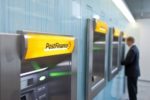Pilotless cargo and passenger planes could be in use within eight years and save airlines billions, according to a report by Swiss bank UBS. But customers remain wary of the new technology despite potential fare reductions.
“In the not-too-distant future, we would expect to see a situation where flights are pilotless or the number of pilots shrinks to one, with a remote pilot based on the ground and highly-secure ground-to-air communications,” the UBS researchers wrote in the surveyexternal link published on Monday.
It suggests that reducing the intervention of human pilots on aircraft could bring huge economic savings and improve safety.
UBS estimated that pilots cost the industry $31 billion (CHF30.1 billion) a year, plus another $3 billion in training, and that fully automated planes would fly more efficiently, saving another $1 billion a year in fuel. Passengers could benefit from a reduction in ticket prices of about a tenth, the authors said.
The report also suggested that pilotless planes would make flying more secure. It found that 70-80% of accidents occur because of human error, with crew fatigue responsible for 15-20% of those.
Dubious
However, passengers will still need convincing. Over half of the 8,000 people the UBS Evidence Lab surveyed said they would refuse to travel in a pilotless plane, even if fares were cut.
“Some 54% of respondents said they were unlikely to take a pilotless flight, while only 17% said they would likely undertake a pilotless flight. Perhaps surprisingly, half of the respondents said that they would not buy the pilotless flight ticket even if it was cheaper,” the report said.
Pilots and pilots’ associations criticised the report’s main findings.
“Pilotless flying is impossible,” former pilot Paul Kurrus, president of Aerosuisse, the airline industry’s umbrella organisation, told Swiss public radio, RTS. “I am very sceptical. The plane’s system is very complex and you need a human to master the problems, which are not predictable. Pilotless planes are just the dreams of a few engineers.”
Steve Landells, the British Airline Pilots Association’s (Balpa) flight safety specialist, also expressed scepticism.
“Automation in the cockpit is not a new thing – it already supports operations. However, every single day pilots have to intervene when the automatics don’t do what they’re supposed to,” he told BBC News. “Computers can fail, and often do, and someone is still going to be needed to work that computer.”
Commercial aircraft already take off and land using their on-board computers, and several other functions are also performed by computers.
Boeing has said it is studying the technology, and last week announced it would move into ‘avionics’ to make aircraft controls and electronics.
Full story here Are you the author? Previous post See more for Next post
Tags: Business,newslettersent,UBS








































